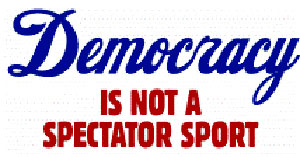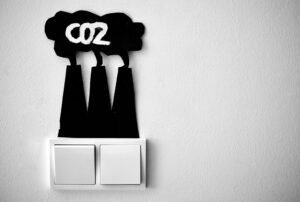
Let’s get the platitude out of the way: “Democracy is messy.” But this year, it may be especially so. Among the many unusual things in this presidential election saga, one that stands out is the questioning of the election’s results—both before and after Election Day. The phenomenon is certainly not entirely new; nor is discomfort with our Electoral College or a split between the national popular and the Electoral College vote. What is disturbing is the degree to which the discourse has been designed to instill doubt among voters that their voices count—that they count. Therein lies a serious challenge to civil society: to stand up boldly in all the right ways.
Our president-elect has been a main driver of that doubt even well in advance of the election. During the third presidential debate, Trump promised to keep us “in suspense” about whether he would accept the election results as reported. According to the Washington Post, “Clinton called Trump’s answer ‘horrifying,’ saying he was ‘talking down our democracy.’” At a rally the next day he reiterated his hesitancy but added he would accept the results…if he won. He and those close to him continued to raise the specter of massive voter fraud right through Election Day.
In the background of all of this was what flowed from the 2012 SCOTUS Shelby County v. Holder decision, which found the preclearance section of the 1965 Voting Rights Act unconstitutional. A lot of individual states, now freed from those constraints, attempted to remake their voting protocols in ways many saw as being race-biased and potentially exclusionary.
In the end, of course, Trump won the electoral vote. Apparently unhappy with his lack of a win on the popular vote, he has tweeted, to widespread bipartisan dismay, his assertion that millions of illegal aliens voted in California, New Hampshire, and Virginia—thus robbing him of his landslide. Deduct these votes, he said, and he would have won the popular tally, too. He then quickly added a short rave about the press’s “serious bias” in not reporting the unsupported allegation apparently picked up from Alex Jones’s notorious Infowars site that, according to a group called VoteStand, three million votes in the election were cast by “illegal aliens.”
So, to sum up, Trump has moved from calling the Electoral College a “disaster for democracy” before he won the election to tweeting disparagingly about “the so-called popular vote.” Is this an unaccountably embarrassing display of acrimony from a victor? Sure. Does it inspire confidence in our electoral procedures? Not in the least.

What seems to have sparked Trump’s latest flip, of course, is Green Party candidate Jill Stein’s challenge to the election results in Wisconsin, Michigan, and Pennsylvania, with the somewhat surprising support of Hillary Clinton’s campaign. Even though the Clinton campaign had “not uncovered any actionable evidence of hacking or outside attempts to alter the voting technology,” according to Clinton campaign lawyer Marc Elias, campaign officials had “quietly taken a number of steps in the last two weeks to rule in or out any possibility of outside interference in the vote tally in these critical battleground states.” Elias cited the “degree of apparent foreign interference during the campaign” as a key reason for the Clinton campaign’s post-election due diligence resulting in its own decision not to challenge the election results.
Sign up for our free newsletters
Subscribe to NPQ's newsletters to have our top stories delivered directly to your inbox.
By signing up, you agree to our privacy policy and terms of use, and to receive messages from NPQ and our partners.
A senior Obama administration official said last Friday, “We stand behind our election results, which accurately reflect the will of the American people.” Further, the official added, “The federal government did not observe any increased level of malicious cyber activity aimed at disrupting our electoral process on Election Day. We believe our elections were free and fair from a cybersecurity perspective.”
Without evidence of significant digital interference in the three states’ election results, it’s highly unlikely that anything will change due to these recounts. All three states’ results would have to flip for Clinton to win the Electoral College vote. Trump’s lead is 10,704 in Michigan, 22,525 in Wisconsin, and 68,030 in Pennsylvania. A Wisconsin recount in 2011, for example, reviewed almost 1.5 million ballots. The election’s loser, who lost by 7,316 votes, only gained a total of 310 votes.
On the other hand, some members of the electoral college are busy trying to convince others that they should vote for a Republican other than Trump and, indeed, one Texas Republican has resigned as an elector rather than cast his vote Trump’s way. (This resignation won’t affect the Electoral College vote because Texas can appoint a replacement Republican elector.) Here is what would happen if both Trump and Clinton were to receive less than 270 electoral votes:
If no candidate receives a majority of Electoral votes, the House of Representatives elects the President from the 3 Presidential candidates who received the most Electoral votes. Each state delegation has one vote. The Senate would elect the Vice President from the 2 Vice Presidential candidates with the most Electoral votes. Each Senator would cast one vote for Vice President. If the House of Representatives fails to elect a President by Inauguration Day, the Vice-President Elect serves as acting President until the deadlock is resolved in the House.
That would certainly be a scene.
Despite persistent jokes about the corruption in certain local election operations and the questionable results of some elections, throughout U.S. history people have generally trusted that elections are fair and fairly represent the intent of the voters. Even in the rare cases when elections are close, recounts usually resolve the contests to the satisfaction of the candidates and the public. This voter confidence in elections has been reinforced in large part by the local officials and volunteers responsible for administering the election process and the candidates and elected officials expressing their confidence in the state.
In a time when communication and symbolic acts from the incoming leader of our government can be charitably described as intemperate and often ill-considered, it falls to all of us to model behavior that recalls the core values of our democracy. But this does not mean “going along to get along.” Our central principles—justice, including social justice, and equality—need to be actively upheld. We must pursue them in our economy, in our discourse, in our criminal justice systems, and elsewhere. Thus, to improve civil discourse, we must hold fast to the tenets more than the trappings of democracy and communicate them strongly without fear or favor. If we wish to elevate public discourse, we ourselves must elevate it through our own words and actions. This is by no means a time to be mealy-mouthed or hesitant, but our democracy depends most upon the people that embody and value it.














